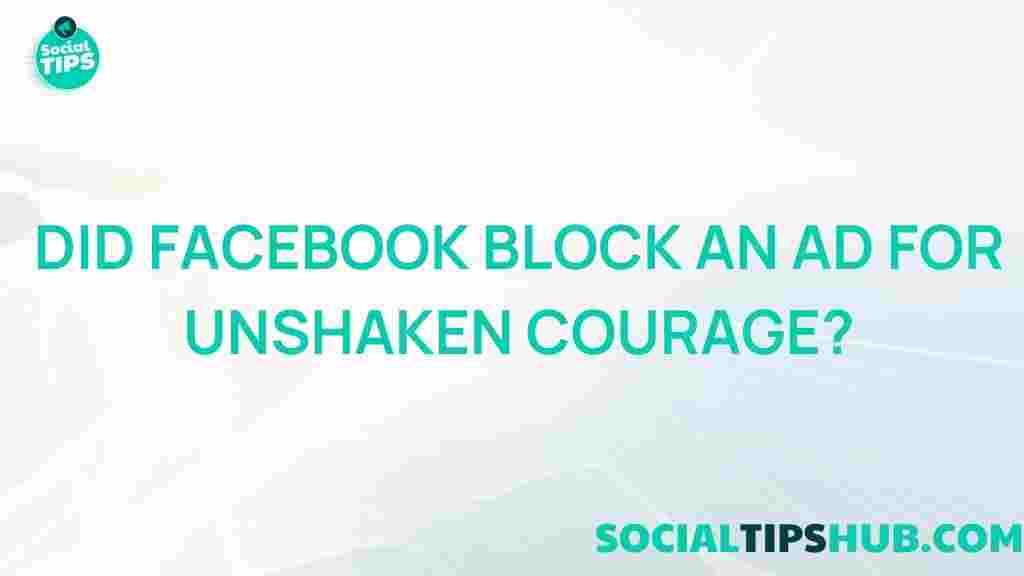The Controversial Ad Facebook Doesn’t Want You to See
In the ever-evolving landscape of social media, few platforms have garnered as much attention—and controversy—as Facebook. With billions of users around the world, the power of Facebook to influence opinions and shape narratives is unparalleled. However, beneath its polished surface lies a myriad of challenges, including the management of advertising content. In this article, we will delve into the controversial ad that has stirred debate and what it reveals about the intricate relationship between Facebook and its advertisers.
Understanding Facebook’s Advertising Policies
Before we dive into the specific ad that has raised eyebrows, it’s crucial to understand Facebook’s advertising policies. Facebook has strict guidelines designed to maintain community standards and ensure a safe environment for users. These policies encompass a wide range of topics, including:
- Prohibited Content: Ads promoting illegal products, adult content, or hate speech.
- Restricted Content: Ads related to alcohol, gambling, and health-related products.
- Targeting Restrictions: Limitations on how ads can target certain demographics.
Despite these guidelines, controversies often arise when ads are perceived as misleading, harmful, or politically charged. The ad in question is a prime example of this phenomenon.
The Ad That Sparked Outrage
The controversial ad in question was launched by a political organization, aiming to influence public opinion on a significant issue. As it circulated on Facebook, users quickly noticed several aspects that fueled outrage:
- Misleading Claims: The ad included statistics and statements that were later debunked, raising questions about its credibility.
- Targeted Demographics: The ad appeared to target vulnerable groups, leading to accusations of exploitation.
- Political Bias: Critics argued that Facebook was complicit in allowing politically biased content to proliferate on its platform.
Why Facebook Doesn’t Want This Ad to Go Viral
As the ad gained traction, Facebook faced immense pressure from both users and advocacy groups to take action. Here’s why the platform might not want this particular ad to gain further visibility:
- Reputation Management: Facebook has worked hard to rebuild its reputation following various scandals, including issues related to misinformation and data privacy. Allowing a controversial ad to spread could undermine these efforts.
- Legal Implications: Given the regulatory scrutiny faced by social media platforms, Facebook might fear legal repercussions from allowing misleading or harmful content to circulate.
- User Trust: Trust is paramount for Facebook’s success. Allowing controversial content could drive users away, impacting engagement and, ultimately, advertising revenue.
A Closer Look at the Ad’s Impact
The ramifications of this controversial ad extended far beyond its initial release. Here are some ways it impacted users and the platform:
- User Backlash: Many users expressed their discontent through comments and shares, amplifying the ad’s visibility even further.
- Call for Transparency: The ad prompted discussions about the need for greater transparency in political advertising on social media.
- Pressure from Advocacy Groups: Various organizations called for Facebook to implement stricter regulations on political ads to prevent similar occurrences in the future.
Step-by-Step Process: How Facebook Handles Controversial Ads
When faced with a controversial ad, Facebook follows a specific process to address the issue. Here’s a breakdown of that process:
- Monitoring and Detection: Facebook employs algorithms and human reviewers to monitor ads for compliance with its policies.
- User Reporting: Users can report ads they find misleading or harmful, triggering a review process.
- Ad Review: Facebook reviews the reported ad against its advertising policies. This can involve consulting third-party fact-checkers.
- Decision Making: Based on the review, Facebook can choose to approve, reject, or remove the ad.
- Notification: The advertiser is notified of the decision, and if rejected, they can appeal.
Troubleshooting Tips for Advertisers
For advertisers looking to navigate Facebook’s complex advertising landscape, here are some troubleshooting tips:
- Understand the Policies: Familiarize yourself with Facebook’s advertising policies to avoid violations.
- Use Clear Language: Ensure your ad copy is straightforward and free of misleading claims.
- Target Wisely: Be mindful of the demographics you choose to target and ensure your content is appropriate for those audiences.
- Stay Informed: Regularly check for updates to Facebook’s advertising guidelines.
- Engage Responsively: Be prepared to address user feedback, both positive and negative, regarding your ads.
Conclusion
The controversial ad Facebook doesn’t want you to see highlights the delicate balance between free speech, advertising, and user safety. As Facebook continues to evolve, the challenges it faces regarding advertising content will only intensify. It’s crucial for both the platform and advertisers to prioritize transparency and responsibility to maintain user trust.
For more insights into advertising strategies on social media, check out this comprehensive guide on social media marketing.
As users, we also play a role in shaping the content that circulates on platforms like Facebook. By staying informed and vocal about what we see, we can contribute to a healthier online environment.
For further reading on Facebook’s policies and guidelines, visit their official advertising policies page.
This article is in the category News and created by SociaTips Team






